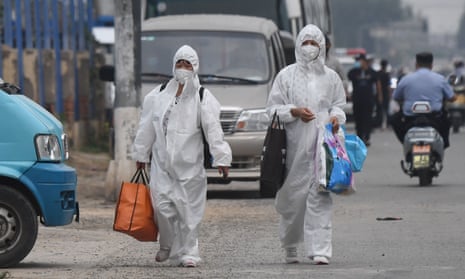A cluster of dozens of new coronavirus cases in Beijing has prompted authorities to lock down parts of the city again after nearly two months without any new local infections.
The outbreak has affected dozens of people, most of whom are asymptomatic, and raises concerns about how the virus might re-emerge, even in places where it appeared to be under control.
In China, much of western Europe and other areas where lockdowns have successfully curbed death and infection rates, authorities are on alert for a possible second wave of Covid-19. It has infected more than 7.6 million people worldwide, and killed more than 425,000, according to the Johns Hopkins University tracker.
Beijing authorities have moved swiftly to try to stop the disease spreading further, closing the Xinfadi food market which appeared to be the hub of the cluster, putting the surrounding district on what officials said was a “wartime” footing, and bringing back restrictions on movement, tourism and sporting events across the city.
There have been six cases with symptoms, and more than 40 asymptomatic cases uncovered so far, and authorities plan to test everyone who worked at the market, which claims to be the largest in Asia for fresh produce.
In many other countries the first wave has not yet peaked. Infection rates are growing alarmingly in countries such as India and Brazil, which has overtaken the UK to become the country with the second-highest Covid-19 death toll in the world.
Authorities in In São Paulo announced plans to dig up cemeteries to clear spaces for new victims of the pandemic, with exhumed bodies being put into bags and stored in large metal containers. The municipal funeral service has bought 12 containers which will be delivered to burial grounds around the city over the next two weeks.
India reported its biggest single-day jump in cases on Saturday, taking its total to more than 300,000. Despite escalating cases and reports of people being turned away from hospitals, the government is continuing to loosen lockdown measures across the country.
In Sudan, a spike in unexplained deaths in camps for internally displaced people (IDP) and refugees in the western Darfur region has sparked concerns about an invisible spread of the coronavirus.
Hospitals in the region have reported an influx of patients with coronavirus symptoms including fever, breathing difficulties and lost sense of taste and smell, according to the Associated Press. Only 54 deaths have been officially confirmed in Darfur out of 193 cases, but doctors fear the true figures are far higher.
“We’re losing a whole generation,” said Gamal Abdulkarim Abdullah, the director of Zam Zam camp for the displaced. He had documented 70 deaths in the past week, he said.
In the US, Dr Anthony Fauci, a senior infectious disease official, has said the country may be reopening too fast, as hospital admissions rise in states including Texas and North Carolina. Both have reported their highest figures since the pandemic began.
“When you start seeing more hospitalisations, that’s a sure-fire sign that you’re in a situation where you’re going in the wrong direction… Maybe we need to slow down a little” on relaxing lockdown measures, he told CNN.
He said people attending Donald Trump election rallies, scheduled to resume next week with a gathering in Oklahoma, risked acquiring or spreading the disease. He said he had not spoken to Trump about the rallies but urged attendees to wear a mask at all times.
In another interview with Yahoo he warned of risks at Black Lives Matter protests. “You’re having crowds, and we recommend not to go in crowds. Physical distancing is impossible,” Fauci said. “When people get animated, they get involved in the demonstration, they start chanting and shouting and screaming, very often they take their mask off.”
A pastor in Argentina turned his church into a bar in protest at the uneven easing of restrictions in Santa Fe province. Church leaders were dressed as waiters carrying Bibles on their trays in a mock service. Pastor Daniel Cattaneo said: “So, apart from the breaded veal headed for table four, here goes the word of God.”
New Zealand has gone for 22 days without recording a new case. Following the recovery of an Auckland woman on Monday, it has no known active cases of Covid-19 and no one is in hospital with the virus.
Police in Nepal have arrested 10 people at protests in Kathmandu, including seven foreigners it accused of “interfering in internal affairs”, as demonstrations against the government’s handling of the coronavirus crisis continued.
The country imposed a complete lockdown in March after reporting its second confirmed case. The number of infections has since increased to 5,062, with 16 deaths, and the government has come under fire for not doing enough to contain the outbreak.
The Dalai Lama has said his thoughts are with those suffering in the coronavirus pandemic and he implored humankind to develop “a sense of oneness”.
The 84-year-old leader of Tibetan Buddhism told the BBC that despite widespread fears over coronavirus, climate change and other social and environmental issues, there is much to inspire and celebrate.
